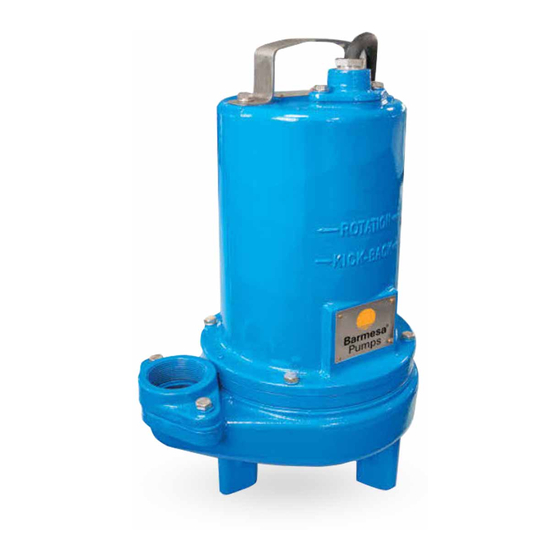- ページ 11
水ポンプ Barmesa Pumps 2BSE51SSのPDF インストレーション、オペレーション&メンテナンスマニュアルをオンラインで閲覧またはダウンロードできます。Barmesa Pumps 2BSE51SS 13 ページ。 Submersible solids handling pumps
Barmesa Pumps 2BSE51SS にも: インストレーション、オペレーション&メンテナンスマニュアル (13 ページ)

Risk of electric shock. Always disconnect the pump from the power source before handling inspections or repairs.
SYMPTOM
A) Pump will not run.
B) Pump will not turn off.
barmesa.com
C) Pump hums but dosen´t run.
NOTE: Barmesa Pumps assumes no responsibility for damage or injury due to disassembly in the field. Disassembly of the pumps or supplied accessories other
than at Barmesa Pumps or its authorized service centers, automatically voids warranty.
POSSIBLE CAUSE
Poor electrical connection,
blown fuse, tripped
breaker or other
interruption of power;
improper power supply.
Motor or switch
inoperative.
Float movement
restricted.
Switch will not activate
pump of is defective.
Defective motor.
Insufficient liquid level.
Float movement
restricted.
Switch will not activate
pump or is defective.
Ecessive inflow or pump
not properly seized for
application.
Pump may be air locked
causing pump not to flow.
(11)
The switch is in manual
(16)
position.
Incorrect low voltage.
The impeller is jammed or
the shaft is loose, worn or
damaged, or inlet
(10)
plugged.
CORRECTIVE ACTION
(1) Check all electrical connections for security. Have
electrician measure current in motor leads, if current
is within ± 20% of locked rotor Amps, impeller is
(1)
probably locked. If current is 0, overload may be
tripped. Remove power, allow pump to cool, then re-
check current.
(2) Reposition pump or clean basin as required to
(2)
provide adaquate clearance for float.
(3)
(3) Disconnect level control. Set ohmmeter for a low
rang, such as 100 ohms full scale and connect to level
(4)
control leads. Actuate level control manually and
check to see that ohmmeter shows zero ohms for
(5)
closed switch and full scale for open switch. (Float
Switch)
(6)
(4) Replace according to the manual.
(2)
(5) Make sure liquid level is above the pump.
(3)
(6) Re-check all sizing calculations to determine
proper pump size.
(7) Check discharge line for restrictions, verifying
(6)
proper operation of valves, including ice if line passes
through or into cold areas.
(8) Remove and examine check valve and verify that
operates well.
(1)
Troubleshooting Chart
11
